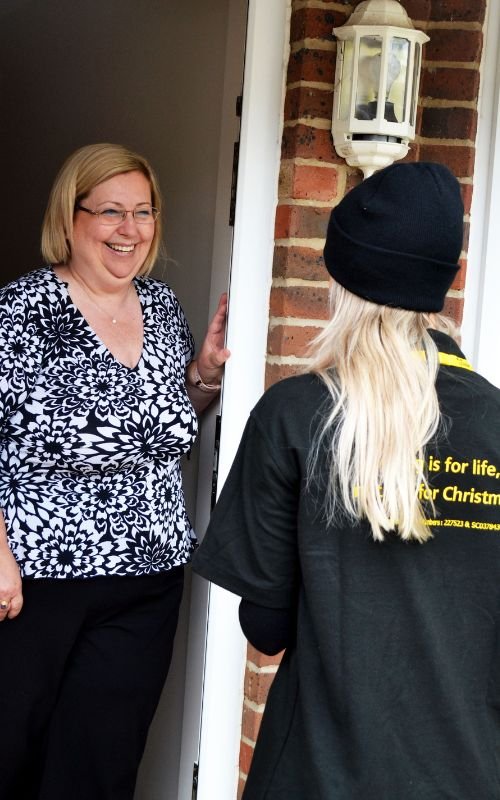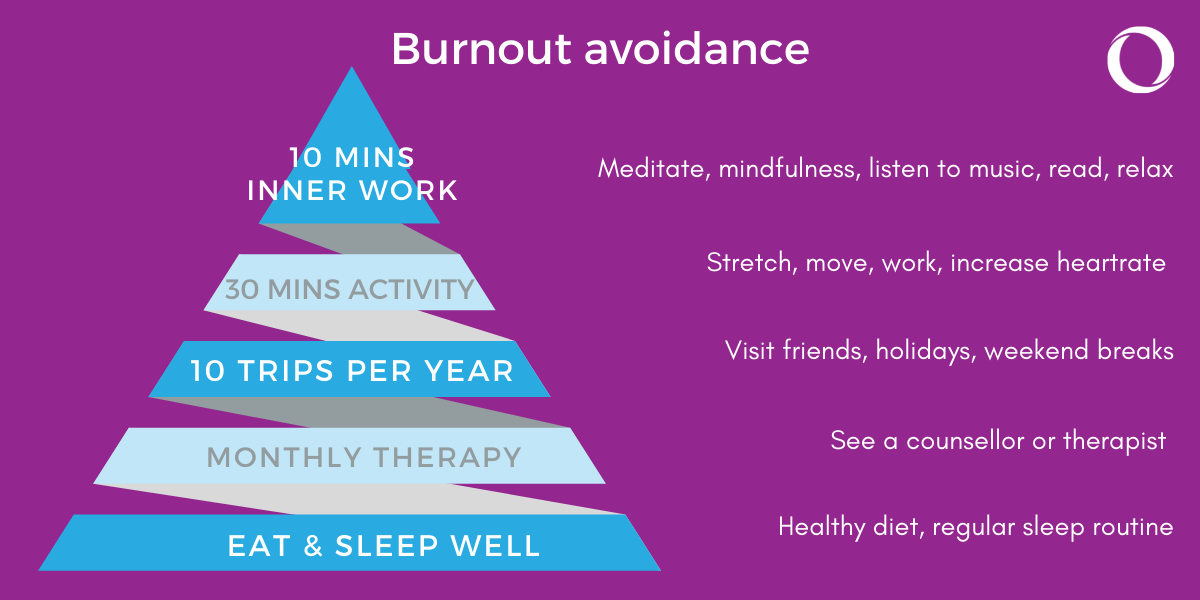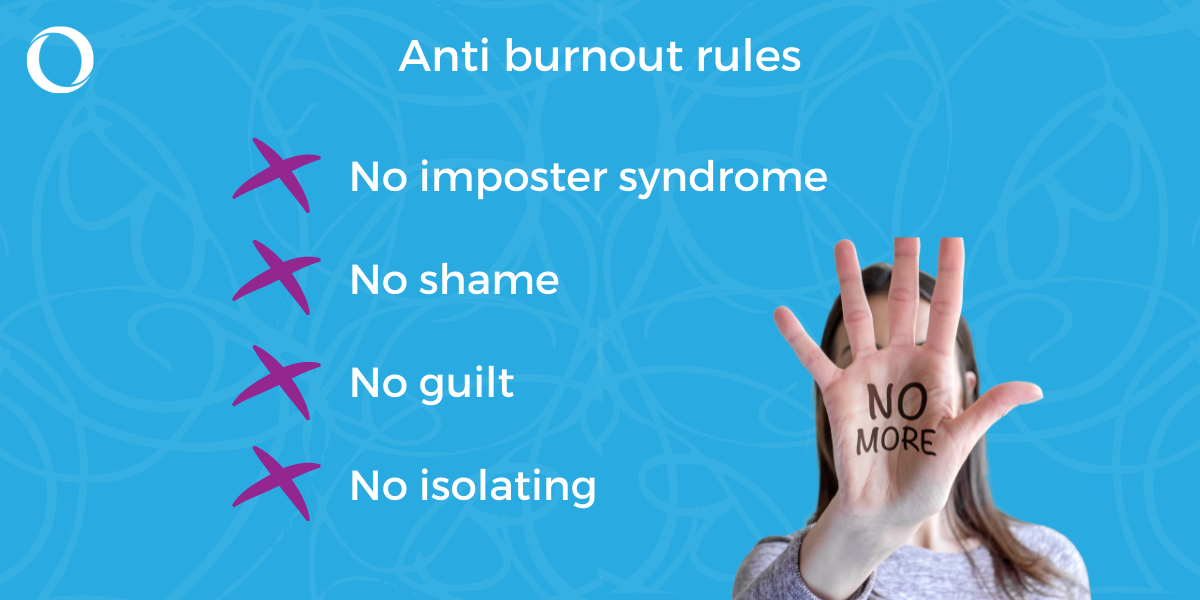How charity fundraisers can spot and deal with emotional burnout
We operate under the belief that the harder we work, the more rewards we’ll reap. But since the pandemic, things have gotten harder. All of us are having to adapt our working lives to the new norm which often means longer hours, adapting to reduced social interaction or dealing with trying to make ends meet thanks to the cost of living crisis.
Stress, anxiety and burn out is on the rise and for those whose livelihoods rely on hitting targets, it can be even harder. Charity fundraisers are not only coping with all of the above, they’re emotionally invested too.
So how does a fundraiser tell the difference between hard work and over work? How do we spot the signs of emotional burnout and how can we mitigate the fallout?
Emotional burnout meaning
The World Health Organisation made the word burnout an official term in 2019, branding it an ‘occupational phenomenon’.
In short, burn out is ‘hitting the wall’, usually after suffering extended periods of stress without enough self-care. Being on constant ‘alert’ and in our ‘fight or flight’ state leads to our sympathetic nervous system overloading and ultimately collapsing.
It gets to the point where you’ve crossed the line from coping and experience total emotional and physical exhaustion.
Many people assume burnout to be like stress, which is it; except it’s the mother of stress with depression thrown in too.
People with emotional burnout feel depressed and completely drained. Feeling burnout includes overwhelm, helplessness and defeat. Those with burnout usually blame and doubt themselves, believing they need to be better or try harder still.
The wider impact of burnout at work
In 2020, government statistics showed that the average amount of time off in the UK for work related stress and anxiety is 21.6 days. This equates to a working month.
The average UK salary (pre-tax) is £29,600 per year, or £2,491 pre tax. Along with the gradual decline in the quality of work prior to needing time off, and then reduced productivity on a slow return from burnout this is a real problem for the UK economy.
Why do we get burnout?
Burnout typically happens because we’re overworking and not listening to our own needs for self-care, diversity, rest and wellbeing.
Much of the problem is that western culture dictates that we should be busy busy busy - all the time. And like a hamster on a wheel we go… until we drop
We feel guilty if we’re not being productive enough and if we are productive, we’re seen as the people to ask to do more!
We are literally programmed to ‘do‘– and to see simply ‘being’ as lazy.
And if you’re the type of person who is practical and efficient, tending to ‘just get on with it’, chances are that you’ll probably have more expectations of you than others do.
You’re probably less likely to perceive yourself as needing to rest or needing help, which is ironic given that the people who take on the most are also the least likely to be offered help too!
Quite literally weeks can slip by without having spent a single moment stopping to check in with your own needs.
And when we finally do submit to exhaustion, how many of us feel undeserving of real rest and self-care, focusing only on how quickly we can get back to our ‘to do’ list?
If people are suffering burnout and don’t take positive health based action, some will attempt to self soothe with things like alcohol, drugs or binge eating to simply push the problem to the back. Which of course doesn’t work in the long term.
Fundraiser burnout
There’s usually two reasons that people decide to fundraise for charity.
The first is because they’re personally drawn to a cause and feel motivated to do something about it. The second is that they’re trained as a professional fundraiser and are employed to fundraise on behalf of particular charities.
But whether they authentically care about a cause or not doesn’t really matter. The very nature of fundraising means you’re the type of person that cares – which is great! Caring is the motivation that helps us put in as much effort as possible to get the best results.
The problem is, that hearing sad news, stories and heartbreak all the time, combined with trying to consistently hit targets by soliciting donors can really start to negatively affect us.
When a fundraiser opens their ears and heart to the scale and seriousness of what charities do, you can’t ‘un-know’ that. And being a caring person means being vulnerable to taking too much on emotionally.
Not only that, fundraisers must be resilient, positive and professional at all times to meet the ethical standards set by the Fundraising Regulator.
Read more about the 13 qualities of a successful fundraiser
Fundraisers natural disposition means they’re generally a lot more empathetic and compassionate. So along with all the other usual stresses of life, fundraisers tend to worry more about a lot of others too.
The other problem is that fundraisers, much like a sales based job, are under constant pressure to deliver their targets.
According to fundraiser research published on Civil Society 26% of professional fundraisers said they had to take time off because of stress, anxiety or depression as a result of their fundraiser role, with just 23% saying they’d never experienced work-related burnout stress or anxiety.
Despite our British culture, which leans toward the ‘stiff upper lip / chin up’ mentality, it’s important not to try to push through.
Worse still is when we hit complete burnout but simply put a sticky plaster on it and wait until we’re just about better enough to begin pushing again.
This type of habitual burnout is not sustainable and will eventually have serious implications on your long term physical and mental health!
What are the 5 stages of burnout?
How to treat burnout
Once you’ve established where you are in the five stages of burnout, it’s important to take action as soon as possible. Self care is always how to handle burnout effectively.
Self care begins with taking a moment to check in with how you’re feeling:
I’m great, not stressed at all – life is challenging at times but I can deal with it
I’m a little stressed but mostly okay
I’m feeling a overwhelmed and can’t seem to get through my to do list
I’m constantly rushing around and in a state of heightened stress and pressure
I’m at breaking point. I can’t see any way out. I’m just exhausted and miserable
I know what I’m doing is harmful to me but I just can’t seem to get the proper rest that I need to give my work 100% any more
If you’re anywhere from the third point down you are too far into these burnout stages. It’s time to have a rethink about how you’re going to reverse back down this path of stress.
How to avoid emotional burnout
Tempting though it is to continue pushing through the stages of burnout, you are simply delaying the inevitable. The only way to replenish and heal is to take a step back and rest.
If we feel bad about something emotionally because ignoring that burnout feeling, we’re at risk of acting impulsively. Rash decisions like lashing out, or quitting our jobs might make us feel good in the moment but make life more difficult later on.
Equally we might spend a lot of time complaining to colleagues or family members about our lives, which only manifests negative thoughts, which again isn’t serving us.
When you feel like things are getting tougher, it’s time to take stock and ask for help. Look at what you can change to improve things.
Define your part in the problem
Sometimes we can do things to make change and sometimes it’s out of our control. If we’re able to let go of things that we can’t control we find mental freedom.
It seems obvious but it’s a good idea to start by reminding yourself that it’s not up to you to solve the world’s problems - or even anyone else’s problems. Nor is it your responsibility to carry others.
The truth is that as a member of a wider community, everybody has a part to play in making the world better. Many hands make light work, not one person busting a gut to do everything.
When you’re getting close to the burnout feeling, it’s time to take mindful action to first remedy and then prevent the harmful stress cycle stages.
How to deal with burn out
First things first. Are you eating properly and regularly? Giving your body the right fuel is essential so eating healthy nutritious food is an easy win. If you start to gain natural energy you can begin the rest of the work.
Every day, put aside dedicated time to self-care with 10 minutes of ‘inner’ work where you simply stop, breathe and be present. You can put on some gentle music, you can actively relax or you can notice your senses.
30 minutes of physical exercise isn’t just about keeping your body functioning well, energised and strong. It’s great for mental health too.
Take regular trips away and put adventure into your life at least once a month.
Actively book a counsellor that you regularly see just for a mental clear out.
Establish boundaries
If you can learn your own limits, you can learn how how to deal with burnout as and when it starts to occur.
Much as it’s tempting to reason it’s ‘just’ another hour, another meeting, another shift, another email, learn to say no and don’t feel guilty about it.
Keeping times of the day that are just for you, not answering that phone call, choosing things that serve you and you alone are all good ideas for preserving your mental health and avoiding burnout.
Revisit the 5 stages of burnout and check in.
Take breaks
All too often we push through and ignore our needs because they’re not ‘urgent enough’.
Take your coffee breaks, your lunch break and all your holiday allowance!
Finish work on time the majority of the time and don’t push yourself if you’re not feeling it.
Making sure you fully step away from the workload and give yourself time to decompress makes every difference to mental health and you’ll work better as a result!
Sleep
Sleep is a fundamental part of wellbeing and it’s the time where we truly take deep rest. During that rest, our brains process all the information we’ve had from that day, our tissues and cells begin repair and regeneration and our immune system gets a reboot.
Establishing a proper routine is the single most effective way to get proper sleep.
That means going to bed at the same time and waking up at the same time every day. By doing this, you’re training your body to release particular sleep hormones and wakening hormones that help your body and mind stay regulated.
Warm baths just before bed, lavender, avoiding caffeine after 4pm and stopping screen time at least one hour before sleep are all great habits to get into for better quality deep sleep.
Reading before bed (an actual book!) is another way to naturally tire your eyes and brain, helping it to switch off from the mental chitter chatter.
Physical exercise
Another one that you can’t short cut. To earn good health is to accept your body’s need to move. Your heart rate needs to go up, your blood needs pump oxygen around your body and your muscles and joints need to be worked.
Exercise helps improve mobility and mental health as well as promoting better sleep.
If you’ve never exercised, think little and often – just 10 minutes a day can make all the difference to your health and there are tons of free exercises and classes online to help get you going.
Food
Another obvious one. We literally are what we eat and if you’re filling up with high fat, sugary processed foods then expect to feel pretty bad. Spikes in energy from processed sugar not only come crashing down, they also leave you feeling more hungry!
Poor nutrition and inefficient vitamin, mineral and protein content means low energy, bad digestion, weight gain and a poor functioning immune system.
Be sure to make healthy choices with plenty of fruit, vegetables, legumes, nuts and a low balance of dairy and fresh poultry and fish.
Talking
Ever heard the saying ‘a problem shared is a problem halved?’
We aren’t meant to deal with our troubles alone!
Talking out your feelings and problems can often be a game changer in how you cope.
Be sure to share your woes with someone who you can speak honestly with - either a professional counsellor therapist or trusted friends.
Talking is not only beneficial for you, it can really help others if they’re experiencing the same things.
Get creative
When we draw, paint, make music, design, decorate, bake or dance, we can become completely absorbed and fulfilled in the task at hand. By being creative we can refill and take that much needed mental break too.
Make time for yourself and doing the things that really bring you contentment and joy, specifically if you’re not feeling that at work lately. Rebalance and prioritise your own needs especially if there’s no productive gain to be made.
Meditation
If you haven’t tried meditation before you might be tempted to think it’s just ‘sitting there doing nothing’. But that’s kind of the point!
How many times in our lives do we allow ourselves the time to literally stop and listen to what’s going on in our minds?
This isn’t just about giving your body a rest, it’s about consciously and objectively observing your thoughts and the way your thoughts control your moods and feelings.
All too often we assume our mind is ‘us’ and we allow it to completely take over.
Meditation teaches us to find solace and peace inside of us, regardless of what’s going on around us.
Taking a few minutes each day to explore what’s underneath your thoughts can be enlightening and powerful.
Meditation has no short cut and some days it’s easier than others. But the benefits are many!
Relaxation
How many times do we think ‘when it’s the weekend’ or ‘when we have our holiday’ or ‘when we’ve retired’ we’ll relax?
We’re taught to believe that busy is good – we’re being productive and we’re ‘doing’. But we’re not a human doing – we’re human beings right?
A great way to trigger the relaxation response is stop and be still. Soften any tension around your shoulders, belly, face or anywhere else you notice you’re ‘gripping’.
Then all you do is simply take 3 deep slow breaths, breathing in through your nose and out through your mouth. Pause for a second longer at the top of the breath each time. Close your eyes if you like.
Learn to enjoy and embrace the art of relaxation – whether that be gentle walking, stroking the dog, knitting, bathing, reading, sitting looking out of the window or pottering in the garden, find things that help you feel relaxed and calm.
Abandon all need for structure and organisation.. just go with the flow and be in the moment.
Screen time
Another one that we’re all guilty of. How many times have you put your phone down only to find you’re looking at it again within minutes?
How many times do you get brain buzz from over staring at your screen, or a sore hand from holding your phone in the same position endlessly.
Screen time should be limited for all of us – at the very least, we should have a minimum of an hour in the day where we’re not looking at phones which doesn’t include the hour before bed where you should be off your phone too!
A new approach
Make a decision once and for all that you matter. Your health and wellbeing matter.
Once you’re back on track and have rebalanced, try to use what you’ve learned when you approach potential donors too.
When you’re pitching, don’t overwhelm the donors with the enormity of the problems your charity is facing, because this will almost certainly cause the donor to switch off.
This is because humans are designed to self-preserve and won’t attempt to tackle massive problems.
Instead, break it down to the achievable goals, the individual successes and the impact their giving will have. So rather than trying to solve world hunger, let’s just give this child a meal for a week.
Since humans tend to like being able to solve problems, this approach is far more likely to have effect and that’s how we chip away and make change.
Remember to stay relaxed and if someone’s not interested, never take it personally. Just think like the duck and let it roll off your back.
For more about the psychology behind why people give read our blog
Conclusion
Instead of seeing self-care as selfish, we need to realise that it’s actually a critical part of being able to improve things - not just for ourselves, but for everyone around us too.
And if a person can be calmer, happier and more confident, then why should we feel guilty about it?
Value you. Know that if you want to keep being able to give, you can’t do it from an empty cup.
Stress, family gripes, heavy workloads are a part of life, but so should caring for yourself be too. Don’t let stages of burn out take control any more!
Interested in a career in professional fundraising? We’re always keen to hear from hard working, communicative people who love a challenge with plenty of support from their team.










